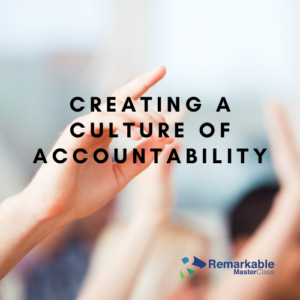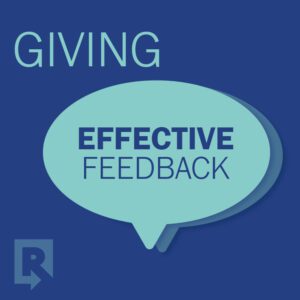Accountability is consistently on the Top Ten of my Hit Parade. Leaders regularly ask me questions about it, hoping I will have the magic answer. They ask:
- “How can I get my people to be more accountable?”
- “Why aren’t people accountable anymore?”
- “Can I coach accountability?”
- And more!
Personal accountability is sorely lacking—and urgently needed in the workplace. When no one is responsible for an outcome, no tough choices are made, no innovative decisions are implemented, and little out-of-the-box thinking is done.
So how exactly can you get more accountability from your team?
The answer is actually quite easy: YOU. Organizational accountability starts with you.
As leaders we must go first – we must provide an example of personal accountability for others to follow. When you are more accountable, by extension, you are helping to build it in your organization. Our willingness to accept responsibility has a trickle-down effect: When our team sees us as willing and able to wrap our arms around a new project or initiative, navigate the challenges and inevitable bumps-in-the-road without making excuses for results, it has an impact on them.
People are more apt to model personal accountability if they see it in their supervisors on a regular basis. Think about it: How can the people that report to you embrace a behavior of accountability if you don’t?
And fortunately, accountability is not just a mind-set—it’s a skill-set that everyone can learn.
In this Master Class, we’ll start by defining what accountability really is – after all, it’s hard to create a culture of accountability if we don’t know what it actually means. You’ll learn the three components of accountability and how they affect your ability to be responsible for your actions.
You’ll learn the biggest barriers to making personal accountability work and how to recognize them as well as key questions we must ask ourselves – and find answers for – to really own our accountability.
We’ll end the Master Class with real-world application tools including the role of accountability in coaching, how to create
greater accountability in meetings, how to create accountability on remote and/or hybrid teams and so much more!
Accountability has a 3-D effect – it impacts results for the leader, for the team (and individual team members), and the entire organization. Regardless of which reasons are most important to a person’s perspective, time spent raising your personal accountability, influencing others to raise theirs, or creating a cultural norm of accountability are some of the most powerful things you can do to improve organizational results.




